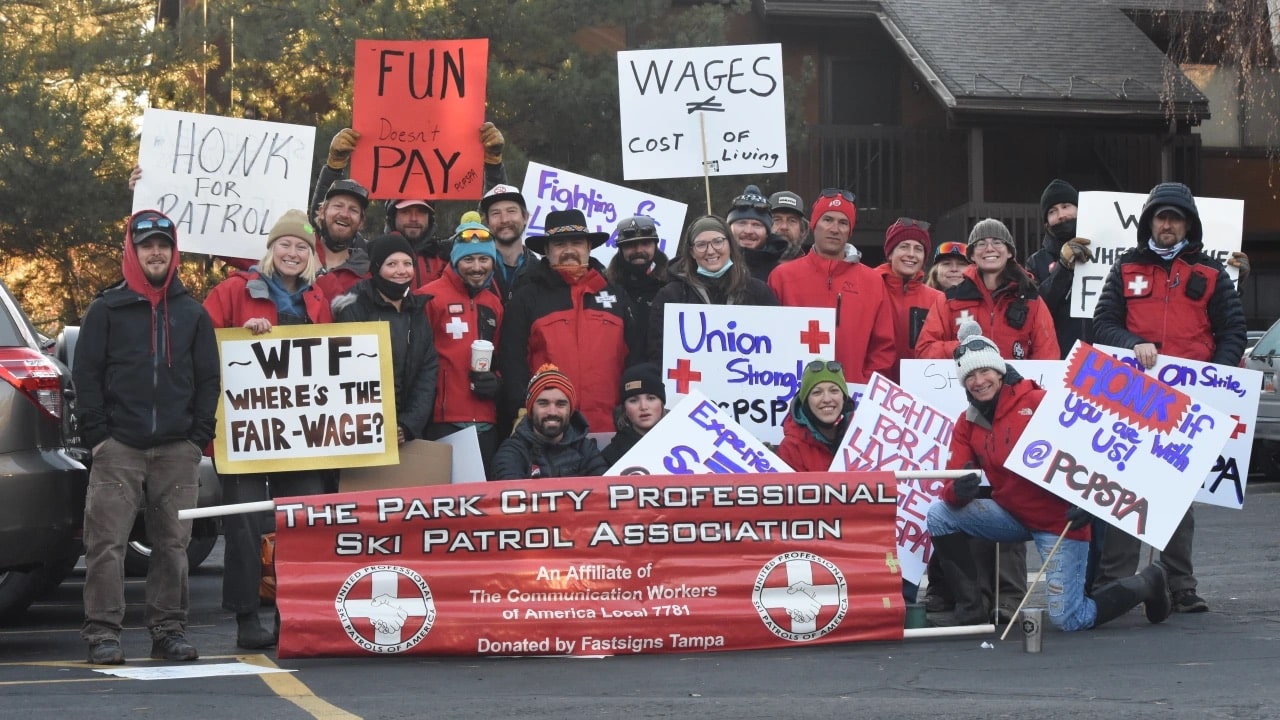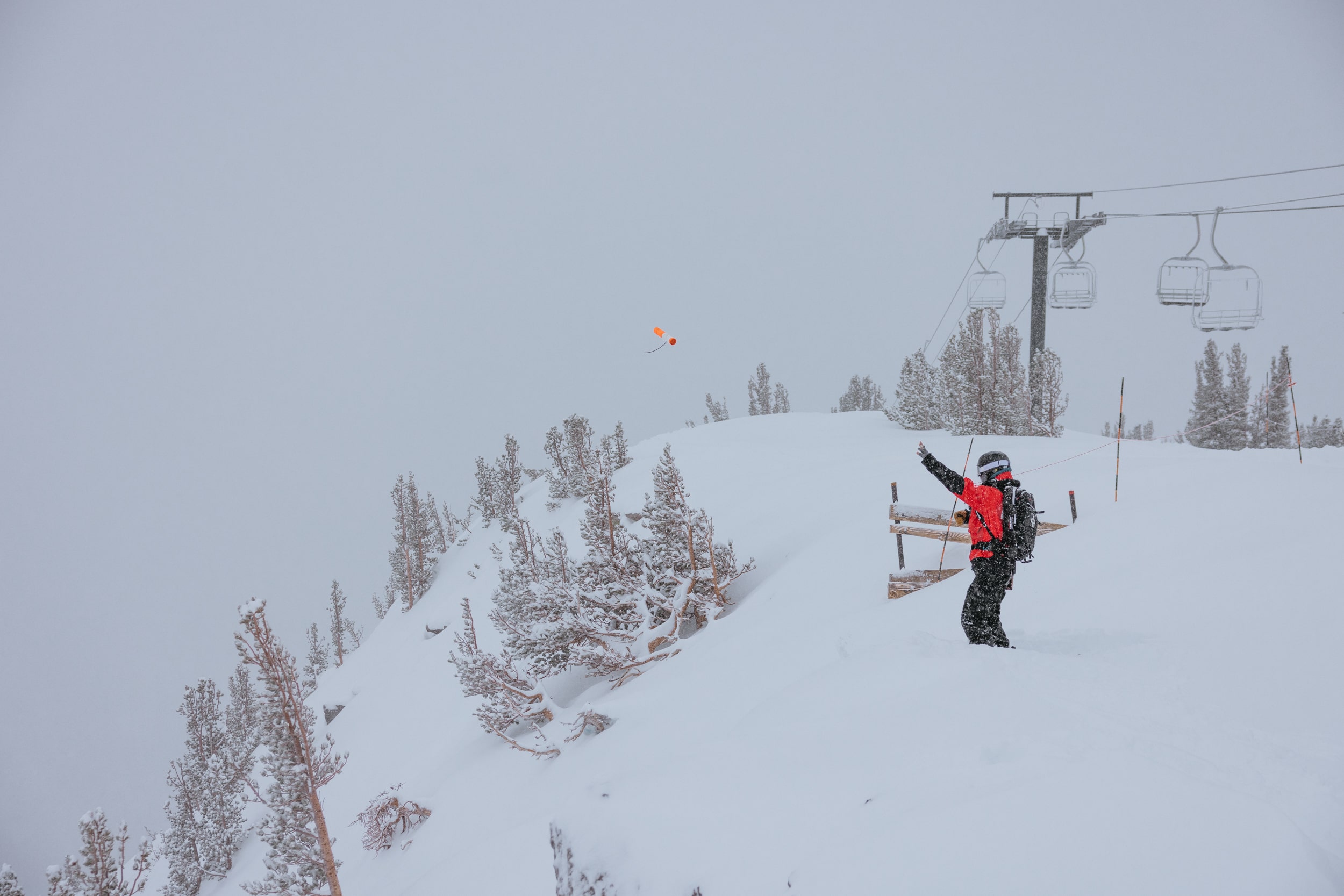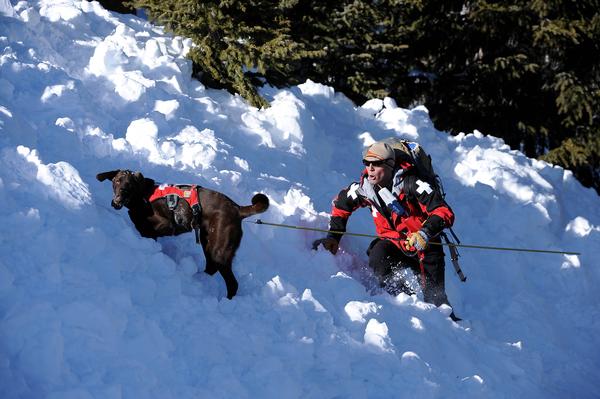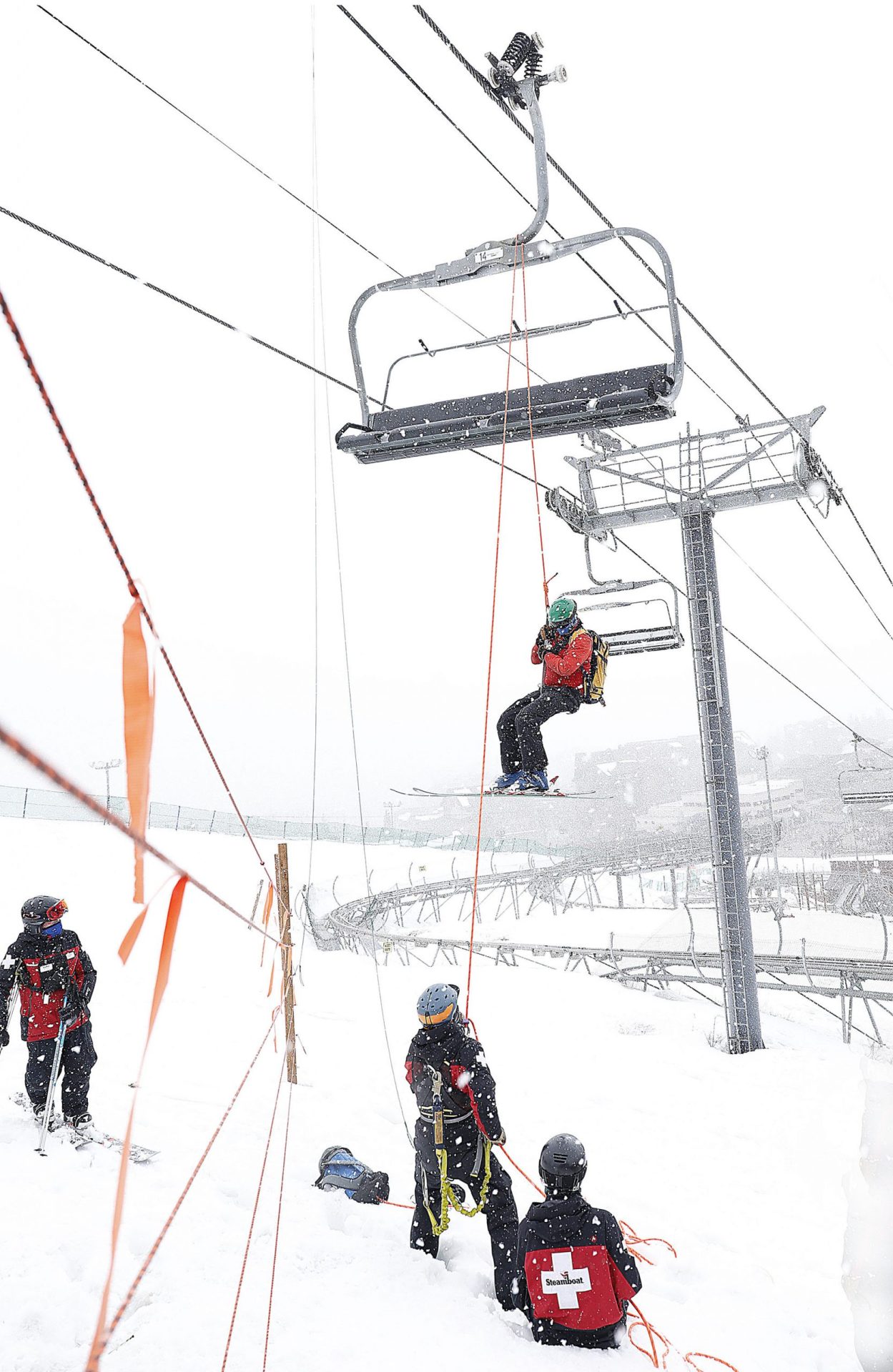
This past year the ski industry saw a continued rise in labor organization. Ski patrollers at Loveland, Colorado, voted to unionize, lift mechanics at Park City, Utah, recently approved their first contract, and ski patrollers at Eldora, Colorado, are waiting to schedule their own union election. This recent momentum in the labor movement has also led to lift mechanics unionizing at Crested Butte, Colorado. While ski area visits are at all-time highs, many workers feel ski areas are not doing enough to keep up with the rising cost of living and to cultivate experienced staff in the highly trained and specialized roles ski patrolling and lift maintenance represent.
Unionization is not new to ski patrolling. Patrollers at Aspen Snowmass in Colorado, for example, have been in a private union since 1986. However, since 2021, several new unions have formed as part of the United Professional Ski Patrols of America (UPSPA) at close to a dozen ski resorts including Park City; Big Sky, Montana; Steamboat, Colorado; Breckenridge, Colorado; and Stevens Pass, Washington. Many of these ski patrols have unionized recently over cost of living concerns. Mountain towns have notoriously expensive housing, and most ski industry wages are not sufficient to make working in the ski industry a viable long-term career anymore.

Many recent ski patrol unionizations have been motivated by similar issues faced by workers across the ski industry: retention and compensation. Ryan Dineen, president of the Breckenridge ski patrol union told me in an interview: “We will continue to push for a ski patroller to be paid for all of the skills they provide to the resort.” Dineen points out that ski patrollers provide specialized services beyond emergency medical care to ski resorts, including operating rescue toboggans, snowmobiling, avalanche mitigation, and being able to ski in any terrain, open or closed, in the ski area. Dineen argues that currently, most ski patroller wages do not adequately compensate patrollers for all these other services beyond emergency medical care. These highly specialized skills often require years to master, making ski patrollers with many years of experience incredibly important in maintaining a safe ski area.
Ski patrols across the country constantly face challenges in retaining experienced staff. The Breckenridge Ski Patrol recently ratified its second contract, which addressed retention and training. Dineen said that this contract should help “raise the bar for the earnings potential of a ski patroller.” Vail recently raised its minimum wage to $20 an hour, a move that some have said was a response to recent unionizations, but Vail Resorts denied this, saying the new wage was a “large-scale, strategic investment into the employee experience.” At Breckenridge, this raise resulted in wage compression for many experienced patrollers. Breckenridge’s second contract sought to undo this compression, as well as bring more training opportunities to more experienced patrollers. Now, every third-year patroller is sent to take a Rec 1 avalanche course, every fourth-year patroller is sent to take a Pro 1 avalanche course, and at least two patrollers go to a Pro 2 course every year. All union members of the snow safety team, which is responsible for avalanche mitigation, also had the opportunity to attend the International Snow Science Workshop this year. Dineen hopes training incentives like these will keep patrollers patrolling longer, as well as bring more knowledge into the Breckenridge Ski Patrol.
Over the last three years, Vail Resorts has increased the average hourly wage of its employees by 30%, according to Lindsay Hogan, Senior Director of Communications. Hogan said in a written statement to SnowBrains:
“Those investments were the direct result of listening to our employees and taking action. […] We fundamentally believe that the best way to foster an inclusive culture where employees feel engaged and empowered is to have a direct and open relationship. We will continue to do the right thing for our team members, regardless of a union.” Hogan added that the goal of the wage increases “was a fully-staffed team that feels supported, engaged, and fulfilled” and that the pay increases have had a “meaningful impact on the employee experience.”

Ski patrols are not the only ski industry employees that have unionized. In November 2022, the Park City lift mechanics became the first group of lift mechanics in the country to unionize. Similar to ski patrolling, lift maintenance requires a unique set of highly specialized skills, and takes years to become proficient. Matthew Wright, Lead Lift Mechanic for Park City Mountain Resort, said to me in an interview: “Our job is very unique in the sense that it is a lot of industries blended together.” According to Wright, being a good lift mechanic requires knowledge of high-pressure hydraulic systems, diesel motors, high voltage electrical systems, rigging, and millwrighting, in addition to snowmobiling and being able to ski to and climb any lift tower in all conditions. “There’s a lot of work that goes into [keeping lifts running] that not a lot of people realize,” Wright told me. A modern high-speed detachable lift can have around a few thousand different error codes, all of which need to be addressable by an on-duty lift mechanic.
Wright said the main motivator for the Park City lift mechanics unionizing was staff retention. “I’d lost a number of individuals over a very nominal sum of money,” said Wright. Lift mechanics are often recruited from within the ski industry, usually lift operators (lifties), and learn most of their skills on the job. Mechanics in other industries such as the oil and gas industry may have similar skill sets, but typically make a lot more money, precluding most ski resorts from attracting them. With market adjustments to wages and more compensation for more training, Wright hopes that their union contract will “show [lift mechanics] a clear path forward so they can see this as a career.”

In April 2023, the Loveland Ski Patrol voted to unionize, citing retention, compensation, and safety as their primary reasons. They started negotiating their first contract in September of 2023, and expect to finish up sometime in the coming months. Chief among their concerns is patroller safety, especially while doing avalanche mitigation work. Kevin Donaldson, a Loveland ski patroller, told me in an interview that “by having a collective voice, we feel it could be safer for individual patrollers to speak up. […] We can have a voice in our safety.” Donaldson described how many resorts’ objections to unionized patrols include wanting to just talk directly with patrols about their concerns. Donaldson said that a few different Loveland patrollers have tried to have discussions with management about various concerns including training and safety, and over time, realized, “Wait, we’ve had these conversations already.” Recent unionizations at Breckenridge, a large conglomerate resort, and at Loveland, a smaller privately owned resort, show that problems motivating workers to organize are not specific to certain types of ski resorts, but are systemic problems in the ski industry.
During their contract negotiations, Donaldson said he has found working with representatives from the UPSPA to be extremely helpful. Through the UPSPA, the Loveland patrollers who are collectively bargaining with the resort owners and management can seek advice from other patrols who have successfully negotiated contracts and legal advice from UPSPA staff attorneys. Since every resort’s operations and policies are different, some aspects of one particular ski patrol’s labor contract may apply to other ski patrols, while others may not be worth negotiating over.
Donaldson has said they are making progress in their negotiations and told SnowBrains there is “a lot of mutual respect” in the bargaining sessions. Negotiations began in September, but will likely continue for a while longer. “Everyone always wants it to go quickly but there’s a business being run. We can’t just sit down and talk about our contract all day long,” Donaldson said. Rob Goodell, Chief Operating Officer for Loveland, agreed saying in a written statement, “We concur that negotiations are proceeding and are mutually respectful.”

Nearby at Eldora, patrollers have been fighting for a union for many of the same reasons as patrollers at Breckenridge and Loveland. Nick Lansing, a professional ski patroller at Eldora, described how many patrollers hope that a union will help them address issues of staff retention and compensation. Lansing said that 31% of their full-time professional patrol staff are brand new, and 75% have worked at Eldora for less than three full seasons. “Those numbers have been creatively presented [by] Eldora,” Lansing said, adding that it is common for patrollers to work full time for a year or two, then transition to working only one or two days per week. “Our year-to-year pay adjustments were not sufficient to keep the talent and the knowledge we have curated [on our patrol],” said Lansing in an interview. A spokesman for Eldora disputed this in an email to SnowBrains, saying: “Ski Patrol consistently has one of the highest employee return rates resort-wide. Our return rate this season, for instance, was 84%. We think our benefits and working conditions contribute to the high rate of return.” It can take years to gain the experience necessary to safely extricate injured guests from steep, complex terrain, and to learn all the operations of even a smaller sized resort. Eldora further stated, “Returning patrollers all make more per hour, based on experience, additional certifications, paid trainings, and performance.” For many unionized ski patrols, the issue of retention and adequate compensation is an issue of safety. “We really do care about safety on the mountain [and] we are all in agreement [as a patrol] that this is the best way forward,” said Lansing.
In November 2023, the Eldora Ski Patrol submitted a petition to hold a union election to the National Labor Relations Board (NLRB). This petition followed an earlier petition to hold an election in late October 2023 that was withdrawn because shortly after filing the petition, a motion to postpone was also filed. “Eldora opposed the motion [to postpone] as it wanted to keep going through the process,” an Eldora spokesman said. After withdrawing the original petition, ski patrollers filed another petition that is currently active. The NLRB has not scheduled an election yet.
As the ski industry continues to grow, many of the roles within the ski industry, like ski patrolling and lift maintenance, will continue to change. The days when Warren Miller worked as a ski instructor and lived in a teardrop trailer in a Sun Valley, Idaho, parking lot are now a distant, slightly unbelievable memory. Soaring housing costs in mountain towns have forced many people to seek other careers or subsidize their ski industry careers with higher-paying summer jobs. Despite new challenges, passion and dedication remain common attributes among ski patrollers and lift mechanics everywhere. Many see unionization as a way of sustaining careers in an industry they love and as a way of improving the safety and experience for the skiing public.